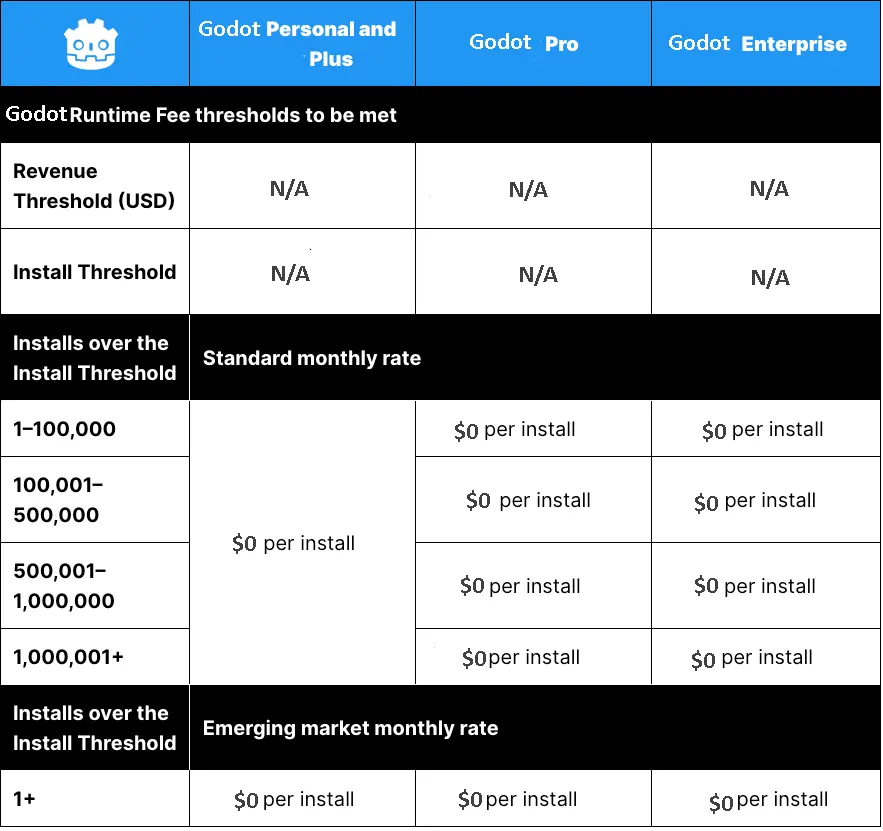Charging per install has to be the most out of touch insane choices they could have made.
There is zero rationality behind the decision, especially given that it’s retroactive and there’s no language in their decision that handles unique user versus multiple users versus multiple accounts.
I’ve had two gaming PCs over the last ten years. On my last one, I replaced the hard drive twice, and I’m on my second hard drive on the newest one. With each hard drive replacement, I’ve had to reinstall all my games. I’m not paying for all of them again with each install but just getting the same files off Steam and installing again. According to this decision, the devs of these games would have had to pay Unity four extra times just due to my hardware upgrades. How is that on the developer at all, and Lord help us if Unity tries to run some BS where players have to pay for each new installation.
The entire gaming industry, even from the “disc era”, doesn’t work with a cost per install model.
Someone claims here that if you use Unity’s internal Ad API then you will make that money back, giving people who put ads in their games a free pass.
If true, Unity is trying to force indie devs to enshittify their products.
That’s exactly what they’re trying to do because their CEO is a nut job crazy man who’s grasp of business economics is embarrassing even when compared to my cats.
deleted by creator
Just when you thought it couldn’t get worse…
The problem with that is that it relies on the idea that people are able/willing to pay and aren’t willing to try something else. Game devs are naturally technical people who are okay with trying new things if their current solution stops being an option. Then there are indie devs who must work cheaply or they will not make anything off their games.
Its a bold strategy cotton, let’s see how it plays out for them.
Unity is, after all, an advertising company.
It’s where they get their money.
How can be retroactive?
I mean legally. The devs agreed to a contract, it can’t be changed with different economic terms later
If someone published an Unity game 4 years ago, has now abandoned the project, doesn’t release any update, why needs to pay a per install fee “for supporting the runtime”? The version is now ancient. I could understand if it was “from version xx.yy”
I’ve been asking this and never got an answer. I think the answer is that it isn’t.
I also asked the question, and got an answer. The hypothesis is that they’ll release new versions under a different license, also meaning that if the devs never agree to the new license, they’d avoid the fee. Of course, that would mean that any engine level bugs in their game would become unfixable. This also means that large developers would be exempt, as they likely have contracts in place that supersede the license agreement.
Doesn’t that go directly contrary to what they actually said, though? They explicitly stated that existing games would be affected.
Could also be. I’m not sure about how the legal situation works exactly. My understanding is that you can’t change a contract, such as a license agreement without the other party’s consent. Maybe they have a clause in it allowing them to revoke the existing licenses, meaning the developers would be forced to agree to the new license or be without a license.
Im trying to think like a money hungry, out of touch POS CEO here.
Unity uses a subscription model right? Where each year you have to renew it and agree to new ToS. Well if they just put in their new ToS that companies have to pay retroactive fees and that company “agrees” to those ToS, then that means it’s not illegal since they technically “agreed” to it…
Hope to he’ll it doesn’t hold up in court but if Unity goes through with this who knows.
Oh yeah, I was thinking about the income sharing rules when you don’t buy a subscription. The people who need Pro features are fucked.
They actually explicitly stated as such:
Q: If a user reinstalls/redownloads a game / changes their hardware, will that count as multiple installs?
A: Yes. The creator will need to pay for all future installs. The reason is that Unity doesn’t receive end-player information, just aggregate data.
Doesn’t steam let you download games you purchased that have since been removed? Will they try to bill developers still in this case?
Yeah. You theoretically can financially DDOS a developer.
Curious if they would charge once install was completed or once install commences.
If I try to install a game and for whatever reason it fails, and I have to try again, would they charge for two installs?
Probally an api call that goes out to Unity once you start a game and the engine comes online.
Im sure they would love to charge devs the instant we click a download link though.
An API call that could be faked. Easily.
Imagine a bot network that screws over a developer because of fake installer API calls.
Bye, Unity! It’s nice to know you’ve gone evil, so that even if you backpedal on this, we’ll know never to trust you again…
On the upside, you think this will end the epidemic of worthless asset flips?
One hour before that Q&A went live:
PM: Hey Steve! Yes, you from development! How can the, uh, that runtime of yours, tell if it’s a new install or a reinstall?
S: As of right now it can’t, we just have aggregate data. We’d need to update it to support that. We have an item on the backlog already if you –
PM: No need! I have all the information I need!
Not to mention that it’s such a sudden announcement. I mean, sure, they gave people 3 months notice in advance, but when you consider the scale of many games probably take longer than 3 months to make the decision AND actually make the switch (or make up for the switch), it’s cause for quite a bit of harm.
Granted, the majority of people may not be affected by it due to needing to meet a requirement of like earning $200,000 and 200,000 installs at a minimum, but I feel like the once you reach that, it’s just downhill from there.
In addition to your example of costing the devs for reinstalling the game, you now have to consider the possibility of a user (or group of users) maliciously reinstalling their games to financially damage the developer. Sure, Unity says they’ll have fraud detection for stuff like that, but then it’s literally up to the people you owe money to decide whether you should pay more or less money to them.
This feels so wrong to me that I feel like they must be going against some law, or they need to be sued to set precedent. I’m not a lawyer, I just think this smells completely like a giant corporation scamming people.
deleted by creator
I can’t believe Godot surpassed Unreal in interest. Astonishing moment.
I really hope Godot becomes the Blender of game engines.
This is a funny analogy because Blender was a game engine at one point and failed.
It was decided that game engine development was over complicating the goal of Blender. It detracted from actual 3D software development resources and trying to make all blender features seamless with it was nearly doubling potential work.
I believe in the open-source world, this is called “mission creep”. It means when a project gradually expands its scope and mission until it becomes unmaintainably broad.
Difference to scope creep (Systemd)?
Also git diff feature-creep?
I like Systemd, my services and timers are huge improvements over trying to use SysV and Cron.
deleted by creator
deleted by creator
Maybe failed is a strong word. It wasn’t very popular and support was dropped out of Blender a few years back but it seems to have new life under the fork UPBGE.
I really want a game staring the default cube now.
The final boss would of course be a doughnut.
Default Cube is a playable character in Super Tux Kart, although unofficially through a user created addon which can be downloaded through the game’s addon feature.
Not Suzanne the monkey?
Also, it’s not 3D, but you may like 140, where you play as a square that turns into a circle when jumping. It’s actually a great game, like a decomposition of what it means to be a platformer.
Not the dreaded cone?
I have a hypothesis: People have heard of Unreal but haven’t heard of Godot, they see folks talking about it and go “What’s that” and google it.
It would be great if a portion of them decided to dip their toes into game development too since it’s free.
You just described what I did just before reading this comment.
I’ve considered “what does the download/install look like” before realizing “You’ve had Blender installed and passively updating for months [pacman] without using it. Stop that”
I mean if you just got fucked over by a proprietary engine then why go for another one. People are delusional if they think Unreal is a safe option.
:D

And we are sure it would stay that way thanks to libre licence. Godot is a collective project, but even if it wasn’t and charge for copy/support/assets, we still would own our copy and could just get someone else to work on it if they screw up.
Actual awnser?
Well Unity Made a announcement to make Devs pay per Download and many devs straight up said their games will be deleted the day these changes are made.
Ding, ding, ding! We have a winner! Unless you have anything to do with Unity, because there are no winners in this shitshow.
Oh, Unity will lose too.
Somehow, I keep remembering Reddit.
Reddit didn’t retroactively try to steal money from developers. Also a game engine doesn’t need a community to exist, it just needs to be good, a community is helpful but not required.
I mean, reddit retroactively stole money from redditors. Any gold/coins you paid for? Gone. Why? Because.
It needs devs to be usefull
If it’s good, it will generally develop a community around it anyway.
This is reddit api Desaster but worse.
Unity will lose way, way more than Reddit.
Almost certainly so. Unity is threatening to bankrupt their customers, while Reddit only did it to some value-adding third parties.
Reddit famously doing red numbers since the API change.
Oh really? Do you happen to have a link I’m curious.
That’s a normal thing to happen after you decide to bankrupt your business partners. (But do we know it already? I thought Reddit wasn’t public.)
But Unity here decided to bankrupt their customers, so I do expect their numbers to change much more quickly.
They will just bankrupt themselves.
Hum, that “just” is really undeserved here. I’m sure they will drag many of their customers with them.
I doubt that, devs can switch Code, Shure some game devs need to remake already written code but i think there will be someone making a code translator right now.
And they tried to pivot by saying it would be by device forcing devs to collect and share their users’ data.
Wich is a violation of EUs GDPR…
I’ve hated Unity since its buggy trash first showed up in flash games Sure they ironed out the bugs and it went mainstream, but I never forgot how it shouldered it’s way into the picture. Now it’s pulling this shit and I’ve got that inevitable mixture of smug and disgusted that accompanies the all-to-familiar experience of “I said this was a bad idea but did anybody listen to me? Nope.”
People switching to Unreal are like the ex-Twitter users who went to Tumblr and Threads.
Certainly Godot is the safer bet (probably why they are surging so much more right now), but Unreal is nowhere near as bad as Threads. Unreal is open source, and the license specifically forbids Epic from making retroactive changes like Unity just did:
- The Agreement Between You and Epic
a. Amendments
If we make changes to this Agreement, you are not required to accept the amended Agreement, and this Agreement will continue to govern your use of any Licensed Technology you already have access to.
Unreal is not open source, it’s source-available. Open source generally gives freedoms like redistribution, yet that is explicitly not allowed by Unreal. To get access to the source, you need to agree to a licensing agreement with them.
That said, source-available is a lot better than most proprietary software licenses.
You’re confusing “free” (as in freedom) with open-source.
ETA: you’re correct that Unreal is source available, but a lot of what you listed is not required to be open source.
What did I mention that’s not part of the open source definition? Btw, I’m using this one, and only mentioned redistribution, which is the first one:
The license shall not restrict any party from selling or giving away the software as a component of an aggregate software distribution containing programs from several different sources. The license shall not require a royalty or other fee for such sale.
The next big part is able derivative works, which is also not allowed as part of the Unreal license AFAIK.
This is the only definition and @raptir clearly hasn’t read it before trying to correct you.
Are you stupid? Read the definition of open source
Source-available is just as bad as proprietary as it distracts from the freedom that open source/free software gives. It also undermines open source by confusion which you are trying to clear up right now. Don’t legitimize source-availability
That’s only true if you’re talking about the goals of open source/free software generally.
If we’re just talking about a game engine and releasing games, being able to modify the engine is absolutely critical when optimizing a large game. So having source available is absolutely a very practical thing when using proprietary software.
So it really depends on what you’re concerned about. Source available is just as good as open source in most cases if your goal is to build closed source software. If your goal is to build open source/free software, it’s awful.
In most cases you are NOT allowed to modify source-available code, just to look at it
I’m pretty sure you can always modify code for personal use, you just can’t always distribute those changes. In the case of a game engine, this would mean you could modify the engine code in development, but you could not release your game with those changes in.
Unreal allows modification and distribution, but only if you’re a licensed user and only for your combined work, but you cannot distribute your own fork of Unreal, aside from a patch set for other developers.
I was really confused because from some reason I was thinking that Unreal and Unity were the same.
I could see this encouraging a whole new form of brigading. Imagine if a developer pissed off the community, thousands of people could go about uninstalling and reinstalling the game over and over, driving up the engine monthly bill for the company.
Did they put anything in place with their new rules to prevent this from being abused?
They claim to. Do you trust their software reporting system?
I trust they did their best.
I also trust that any sufficiently tech savvy individual will be able to bypass that system. It only takes one person to pull it off and then it’s public knowledge. Sure, they’ll fix it, and then someone will do it again.
Small companies can’t afford to take that risk and larger companies won’t want the hassle.It’s a shame too. I liked Unity more than Unreal. Oh well.
I trust they did their best.
Lol. This is a for profit company sir
The point was, do you trust their software to accurately detect and ignore repeat installs and pirated copies, when it’s in their obvious interest to half ass that detection and charge devs more?
I spent the last 10 hours trying to learning Godot, and I love it! Seems like a mix of the best things from Unity and Blender.
It did just occur to me that the amount of time I’ve spent over the last few years tinkering with Godot as a hobby just got more valuable.
Well thats another company imploding on itself, really colors you surprised, sinks you, causes your submarine to turn into a crushed soda can.
It’s what happens when you make a company public and all they want is return on their investment yesterday.
That’s a leadership issue though. The CEO’s job is to communicate expectations to the board and balance long term and short term returns.
Except a lot of companies and investors don’t really care about long term profit anymore anyway.
That’s a popular quip, but it’s just not true. If it were, Unity would lay off most of its staff and only do bug fixes. That way they’d save a ton on salary, and they probably wouldn’t lose any customers for a couple years until they fall far enough behind, so their quarterly financials would look great for about a year until they started losing customers.
This isn’t that. This is just a classic example of the leadership not understanding the business they’re in and trying to maximize profit. I think they overestimate the value of their product and what their customers are willing to pay for.
Feels like I’m living the Pathfinder 2e boom again, I love it. Could they send the Pinkertons to the Cuphead studios next to perfectly do everything wrong
The nice thing about a company being run by evil people is that you can rely on them to eventually do something overtly evil, and then everyone will be aware they are evil.
Because people learn their lessons only when they get punched in the face
2022: OnlyFans wanted to ban porn
2023: Unity wants to kill free-to-play games
I doubt they will learn from this
Except this licencing change removes sustainability from all licencing models except the ones that run subscription models or advertising.
Now they say they aren’t going to impose this crap over any not for profit or for profit that’s earning revenue under 200K. But I have serious doubts that certain scenarios are going to slip through the cracks.
What it is essentially a way to bleed any viral indie game studio dry of their capital, which could force them to declare bankruptcy and sell off their assets.
I wouldn’t be surprised if this was a way to build a unity game studio.
- Game goes viral and reaches the threshold of 200K+ revenue
- Every install and reinstall of the game gets charged, costs start to outweigh profits.
- Money drains fast with no way to stop it.
- Indie company declares bankruptcy due to cash flow issues
- Unity demands payment for unpaid bills in assets - gets the ownership of game title as payment.
- Unity opens game studio and continues to sell the game, while employing minimal Devs to maintain it.
Bam! they’ve a bunch of viral hits completely for free under their umbrella in a bunch of payments. And because they own the engine, they can make money hand over fist while stopping everyone else from doing the same.
That said I’m sure they have separate payment and licencing deals with big AAA companies. So really it’s only the indie companies that end up with a viral hit that get screwed.
So the other option is that they do not open a game studio and they’re merely just doing big techs dirty work and taking out their competition, while providing IP fire sales for big tech.
That said, once the company goes after a group for failure to pay this money, I wouldn’t be surprised if a legal fight ensued in order to declare the terms of service unenforceable and/or anti consumer and have them nullified or forcibly rewritten/reverted. If that happens I’m sure the EFF or other non profit software foundation will end up providing legal funding and or services. Heck it could end up being a class action.
That 6-step plan is very evil, I love it. Hopefully people will now understand that proprietary software always leads to abuse. Everyone should switch to Godot.
What about the tons of games that already exist and we bought? What about the games being worked on right now? This is a disaster for indies.
Yup.


















